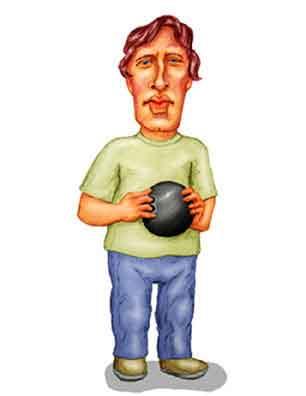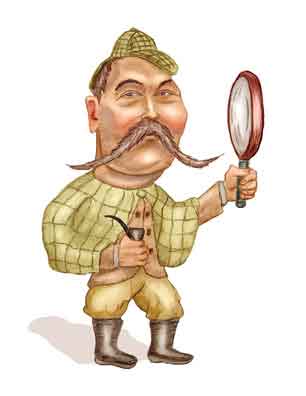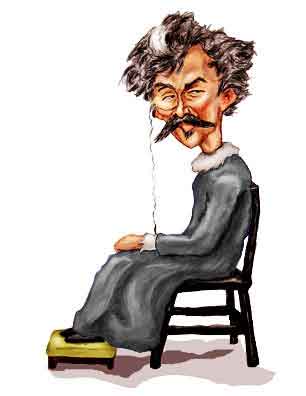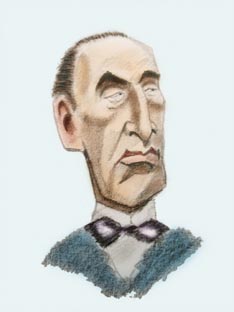Oscar Wilde
From the first it was clear Oscar Wilde was not going to be just your ordinary Joe. Precocious as a child, in his last year at Trinity College Dublin he won the Berkeley Medal for Greek. He then received a scholarship to Oxford where he won a first class degree in the general classics course called "Mods" and then an additional first class in the subsequent broader degree known as "Greats". Finally in his last year he picked up the Newgate Prize for (English) poetry. Not bad for a young man not yet twenty-five.
Although most everyone at Oxford knew Oscar, he was not particularly well liked (later a signed copy of his first book of poems was refused when it came to a student vote at Oxford Union). Some of his fellow students also questioned the judgment of the examiners and believed Oscar's outstanding examination marks were granted more from the sheer volume of the paper he used rather than on the content. That's probably not true although Oscar indeed wrote in a huge hand with only about four words per line and about six lines per sheet. He was continually going back to the examiner's desk for more paper.

Oscar Wilde
Not Your Ordinary Joe
It was at Oxford that Wilde became associated with the aesthetics movement which at the time had become the fad among the more genteel young men of Britain. Oscar himself defined aesthetics as the science of the beautiful, but it was no more (or no less) than a movement dedicated to making art a central part of life. Art then (as now) was rather loosely defined and included anything from painting to music to literature, the latter giving particular emphasis on poetry.
Oscar left Oxford in 1878 and continued to move in literary and artistic circles. He published articles and poetry in the various magazines, which certainly does not account for his rapid rise to national attention. The truth is Oscar is arguably the first modern celebrity where his fame was due to a carefully crafted public image and media attention. He affected long shoulder length hair, extravagant formal jackets, and knee breeches and soon became the inevitable butt of jokes and scorn. In 1881, a scant three years after Oscar left Oxford, Gilbert and Sullivan satirized (some say ridiculed) the whole aesthetic movement in their operetta Patience. The character of Reginald Bunthorne (described as a "fleshy poet") was generally taken to be a caricature of Oscar even though George Grossmith, the chief patter singer, played the character in eyeglasses, white forelock, and with a particular "Ha! Ha!" laugh. This was, somewhat ironically, a take-off on the American painter, James McNeill Whistler, a one time friend and later nemesis of Oscar.
Far from injuring Oscar's reputation, Patience was to fan the flames of his fame even further. Knowing a drawing card when he saw one, Richard D'Oyly Carte, the manager of the Savoy Theater (where Gilbert and Sullivan's operas were performed), immediately signed Oscar to give a series of lectures on aesthetics. The talks in England were successful (and lucrative), and Richard arranged for Oscar to go to America.
Surprisingly, Oscar was a hit in America, particularly by those who had no preconceived notions of what to expect. The scene in the Stephen Fry movie Wilde where the miners of Leadville, Colorado give Oscar a cordial welcome is accurate in gist if not in detail. Although Oscar did go down in the mines (a trip he enjoyed), he actually lectured in the opera house (which all towns of any size had), not in the tunnels. Oscar himself wrote that the miners were perfectly delightful people and reported that when he described Whistler's paintings the miners drew their guns and went looking for Jimmy. As with many of Oscar's first hand accounts this tale should not, of course, be taken too seriously.
Oscar returned to England a full blown international celebrity. He continued to publish articles, stories, and poems. At dinner one night with the editor of Lippincott's Magazine, Oscar agreed to write a novel for serialization and soon penned The Picture of Dorian Gray, which even today finds reference in popular culture (Dorian was one of the characters in the Sean Connery film, the League of Extraordinary Gentlemen). Another of the dinner guests was a young Scottish physician who had recently published a short novelette and agreed to write a sequel for Lippincott's. The book by the doctor - who was then known simply as Arthur Doyle - eventually became just a wee bit more popular than Oscar's when it was published as The Sign of the Four, the second story to feature Sherlock Holmes, today the most recognizable character in fiction.

Sir Arthur Conan Doyle
More Popular Than Oscar
Oscar himself did not stagnate in any literary sense. In 1887, he became the editor to the Women's World and even ventured into political think pieces with his classic "Soul of Man Under Socialism". Wilde's essay is by no means just a starry eyed vision of utopia, but a serious discussion of the problems of implementing a system of government where no people would be given an advantage based on connections or birth while still maintaining freedom of thought and action. Still in today's world where the average citizen (at least judging by the leaders they elect) embraces the concept that job security, decent retirement pensions, and health care should be limited to top corporate executives, multi-millionaire athletes, celebrities, and elected officials, Oscar's solutions are all too easily dismissed as theoretical pipe dreams with no hope of realization.
True literary respectability finally came to Oscar when he began writing his plays. His first written play was Vera or the Nihilists (which when staged a number of years later was a flop), but his real smash hit was The Importance of Being Ernest, his only play that has really stood the test of time. Even today there is some theater somewhere where the production is being staged (usually to good reviews), and it has been made into a number of film versions, the most recent in 2002.
Throughout his professional life, Oscar considered himself an artist, a self-classification that not everyone agreed with. Jimmy Whistler, although originally on fairly good terms with Oscar, eventually saw Oscar as a lazy layabout and artistic poseur who hung around with real artists ad purloined his famous bon-mots from the conversation of others. Jimmy's opinions and Oscar's retorts may have started out as rather good natured give and take but eventually turned rather nasty. The famous feud eventually became a battle of letters to various editors and the two men eventually quit speaking.

James McNeill Whistler
First Oscar's Friend; Later His Nemesis
It was when Oscar met and befriended Lord Alfred "Bosie" Douglas around 1891 that things got serious and ultimately disastrous. Although in his later years Alfred down played the extent of the "familiarities" (as he put it) that occurred between him and Oscar, Lord Alfred's father, John Sholto Douglas, the Marquess of Queensbury (yes, the Queensbury of modern boxing's Queensbury rules) suspected that Oscar and Bosie were indeed more companionable than contemporary mores - and laws - permitted. He ordered his son to stop associating with Wilde. Naturally like most children, Bosie ignored his father.
Determined to end Oscar and Bosie's friendship, Queensbury began hounding both Oscar and his son. He once showed up at Oscar's home on Tite Street and was thrown out and then tried to cause a disruption of a performance of The Importance of Being Ernest. Finally, Queensbury finally left his calling card at Oscar's club with a near illegible note usually transcribed as, "For Oscar Wilde posing as a so[m]domite." (It should be noted a most careful and painstaking analysis of the handwriting by one of the most renown Wilde scholars of the 20th century has concluded the actual wording was "posing so[m]domite". But with all due respect, CooperToons believes the words are closer to the original interpretation for reasons you can read in a new window by clicking here). With the support of (and some say the vehement urging of) Alfred, Oscar initiated a prosecution against Queensbury for libel. Some of Oscar's acquaintances and friends - among them George Bernard Shaw and the publisher Frank Harris - tried to talk Oscar out of what they were sure would be a losing case. But to no avail. Queensbury was arrested.
By the time of his trial Oscar was a wealthy man but living beyond his means. Still after being assured that Lord Alfred's family (minus his father) would finance the case, he hired the best lawyers available and retained Sir Edward Clarke who earlier had attracted national attention when he was called on to cross-examine the Prince of Wales. Queensbury, too, could hire the best and was represented by (later both Sir and Lord) Edward Carson. Edward had in fact been a classmate of Oscar's at Trinity College and on learning Edward would be barrister for the defense, Oscar made his famous remark, "No doubt he will do his job with the added bitterness of an old friend". Although Edward and Oscar did indeed know each other (and were indeed on first a name basis), the two men were never close friends.
Ned (as Oscar called him) was initially reluctant to take the case, mainly because there was little to show that Oscar had posed as anything. The only evidence was a couple of flowery letters to Alfred plus some passages taken out of context from Oscar's published works. However, Queensbury had also hired a private detective who began snooping around. Although Queensbury's defense team had no authority to grant immunity, a number of young men agreed to testify they had various - ah - "dealings" with Oscar, dealings which to put it mildly fully supported Queensbury's charges. In short, Oscar had gone far beyond posing, and the allegations that Queensbury made were indeed true, giving the Marquess an iron clad defense against libel.
Oscar's behavior was reckless in the extreme. British libel law required a written "plea of justification" by the defense, and the original court document was amended to detail Oscar's encounters. Names were named and places specified. So Oscar knew full well what he would have to face as he assured Sir Edward that none of the allegations were true. He even seemed to enjoy himself as he gave his testimony and was quite confident as Ned stepped up for the cross-examination.
Oscar first misstated his age - in Jack Benny fashion - as 39. Ned had Oscar's birth certificate and asked wasn't he more than forty.
"I have no wish to pose as being young," Oscar replied and admitted his birth certificate seemed to settle the matter.
Ned later asked about the "extravagant" letters Oscar had written to Alfred. Would, Ned ask, Oscar explain what he meant when he wrote that Alfred's "red rose-leaf lips" should be made as much "for the music of song" as for the "madness of kissing"? Oscar answered the letter was merely a prose poem and was not to be taken literally.
Ned also quoted from Oscar's book The Picture of Dorian Gray. Could he explain why Dorian told another man "I have adored you extravagantly"?
"Do you mean financially?" Oscar queried.
Ned was impatient with the repartee, "Oh, yes, financially!" he snorted. "Do you think we are talking about finance?"
"I don't know what you are talking about," Oscar replied.
Again Ned went back to quoting Oscar's letters, "'Your slim gilt soul walks between passion and poetry,'" he read, then asking, "Is that a beautiful phrase?
"Not as you read it, Mr. Carson," Oscar said, "You read it very badly." Ned snapped back that he wasn't an artist, and when he heard Oscar give testimony, he was glad he wasn't. That outburst brought a protest from Sir Edward.
"I don't think my friend should talk like that," he told the judge. Sir Edward then turned to his client, "Pray do not criticize my friend's reading again."
But when Ned got around to questioning Oscar about the various young men mentioned in the plea of justification, Oscar's answers were less glib. It seems one of Oscar's acquaintances (who among other things kept a dress in his room) had arranged Oscar to meet the men, all in their late teens or early twenties who were newspaper boys, valets, grooms (stable hands), and coachmen if they were employed at all. Some were known "renters", the slang for blackmailer - at least blackmailers of a certain genre. They had virtually nothing in common with Oscar in terms of education and intellectual interests, but still Oscar admitted to meeting them, taking them to expensive hotels and restaurants, buying them clothes and gifts, and even taking them on vacations. As name after name and encounter after encounter was toted up, Oscar's answer that he simply enjoyed the company of youth and had a passion to civilize the world began to have a very hollow ring - very. Wilde's attorneys, both Sir Edward and the young Travers Humphreys, were getting decidedly nervous, and soon Ned was getting in a few zingers of his own.

Sir Edward Carson
The Bitterness of an Old Friend
Referring to one of the dinners, Ned asked, "What enjoyment was it to you to entertain grooms and coachmen?" Oscar replied he liked being with the young, happy, and free.
"You did the honors to the valet and the groom?" he asked incredulously. Oscar simply said he had entertained his guests.
"Was there plenty of champagne?" Ned asked. Oscar replied there was.
"You did not stint them?" Ned queried.
"What gentleman would stint his guests?" was Oscar's expansive reply.
"What gentleman would stint the valet and the groom?" Ned again snorted sarcastically. And again Sir Edward (and Oscar) protested the remark.
The cross examination came to heady climax when Ned asked Oscar about a young waiter at one of the dinners.
"Did you ever kiss him?" Ned asked.
"Oh, dear no," Oscar replied, adding, "He was a peculiarly plain boy. He was, unfortunately, extremely ugly. I pitied him for it."
"Was that the reason why you did not kiss him?" Ned shot back.
For once, Oscar was virtually incoherent and stammered out several unintelligible explanations. At one point he said if he was asked why he had not kissed a doorpost it would be because he didn't like to kiss doorposts. Ned kept haranguing Oscar for an answer until Oscar simply said his reply was flippant. Ned then moved on to other questions and eventually sat down.
By this point, Oscar's own attorneys were pretty much convinced Oscar had at least "posed" as Queensbury alleged and probably went far beyond posing. Then once Ned began his introductory address to the jury, he said he would put the young men on the stand to testify against Oscar. Sir Edward now realized not only was Queensbury's acquittal assured, but Oscar would likely end up being arrested in open court once the verdict was delivered. So he later met with Oscar and advised him to withdraw from the prosecution. Oscar, he added meaningfully, need not be present when he made the motion. The next day Sir Edward informed the court that his client was withdrawing the charge, and on the judge's instructions the jury rendered a verdict of not guilty - without even leaving the jury box. Queensbury walked out of court a free man.
Although Oscar had time to escape to France, he did not do so, and later that day he was arrested and charged with "acts of gross indecency". The charges were misdemeanors, although rather severe ones, and after two trials (the first ending in a hung jury), Oscar was convicted and spent two years in prison, first at Pentonville and later at Reading. On his release he went to France where he lived on a small allowance given to him by his wife Constance (she never saw him after his release), on the charity of his friends, and the royalties of his last poem "The Ballad of Reading Gaol". He died on November 30, 1900 in the Hotel Alsace, now the luxurious five star L'Hotel. Oscar's room, by the way, is still there.
References
The Real Trial of Oscar Wilde: The First Uncensored Transcript of the Trial of Oscar Wilde vs. John Douglas (Marquess of Queensberry), 1895 Edited by Merlin Holland, Fourth Estate (Harper Colliins, 2003). Verbatim and complete transcript of the libel trial. There is considerable differences in the actual words in this transcript and quotes from The Three Trials of Oscar Wilde by Montgomery Hyde cited below. In general, the versions reported by Montgomery are those quoted above.
There's not much commentary, and so for those wanting an introduction to Oscar, you might first dip into various biographies.
The Three Trials of Oscar Wilde, H. Montgomery Hyde, University Books, (1956). Later editions of this useful and interesting book by one of the great Wilde scholars of the twentieth century are available including an accessible volume from Dover retitled slightly as The Trials of Oscar Wilde. The volume provides a brief biography of Oscar, an account of the three trials, and a final summary of Oscar's later years.
Montgomery, by the way, was a major force in initiating legislation that decriminalized homosexual practices among consenting adults in the UK. Such a stand, laudable as it is by today's standards, was so controversial at the time that it ultimately cost Montgomery his seat in Parliament.
Oscar Wilde, H. Montgomery Hyde, Farrar, Straus and Giroux, N Y, (1975). The first really definitive biography, again by Montgomery. Not a huge book and a good place to start for the fledgling but serious student of Oscar's life.
Oscar Wilde, Richard Ellmann, Knopf (1988). This book is now considered the definitive (and a monumental) biography of Oscar, although it's a bit amusing that Oscar could fool even a scholar teaching at his old alma mater, Oxford. Richard tells the story of when Oscar was in prison he noted a fellow prisoner in the exercise yard trying to signal him. This was strictly against the rules, and Oscar ignored him. But when the man used the sign of a freemason's orphan - a sign that no Mason could ignore and Oscar was a member - Oscar had only one solution. He asked the warden to given him a pair of dark glasses to wear while in the yard. Of course, the true Oscar afficionados recognize this as the bantering dinner story he told Robbie Ross and was related in his letters. Like so much of what Oscar wrote and said, he didn't expect us to take him seriously and would have been both amused (and delighted) to find out he was.
Complete Letters of Oscar Wilde, Rupert Hart-Davis and Merlin Holland, Henry Holt (Pub). 2000. A revised and more complete edition of the earlier volume, and no real Oscar fan can be without a copy. Oscar's personality comes through in his own words and the book includes the full text of Oscar's letter written in prison to Bosie now known as De Profundis. Personal opinion, Oscar's letters are his best writings.
Oscar Wilde The Aftermath, H. Montogomery Hyde The story of Oscar during his imprisonment and afterwards. An OK book for the Oscar fan, but it seems a bit unorganized. But the letters of Warden Martin who was a guard at Reading during Oscar's incarceration are included, and it's amazing how articulate he was in his later years. A far cry from the young guard who once wrote an irritated note to Oscar after Oscar chided him gently for promising to bring him a newspaper: "Your [sic] ungrateful!" Martin wrote, "I done more than promise!"
Wilde (Film, 1997). Stephen Fry (Star), Brian Gilbert (Director), Julian Moore (Script). Although CooperToons is often criticial of people using films for historical background, this film ranks as one of the better exceptions. Yes, you still have to be careful in accepting any individual scene as verbatim history (most are not), but the filmmakers did everything possible to make this film accurate and faithful, at least as much as can be done in a motion picture. The dialog is culled from Oscar's own words and his double life - kind loving father and husband by day / party animal (to put it mildly) by night - is very well depicted. Of course since it is a film, the action has to be compressed and summarized and depicted in the form of action. The shouting matches of Lord Alfred and Queensbury accurately represent the discourse between the father and son, but are actually drawn from their correspondence. Lord Alfred's celebrated taunt: "WHAT A FUNNY LITTLE MAN YOU ARE!" - shouted in the movie - was actually sent by telegram.